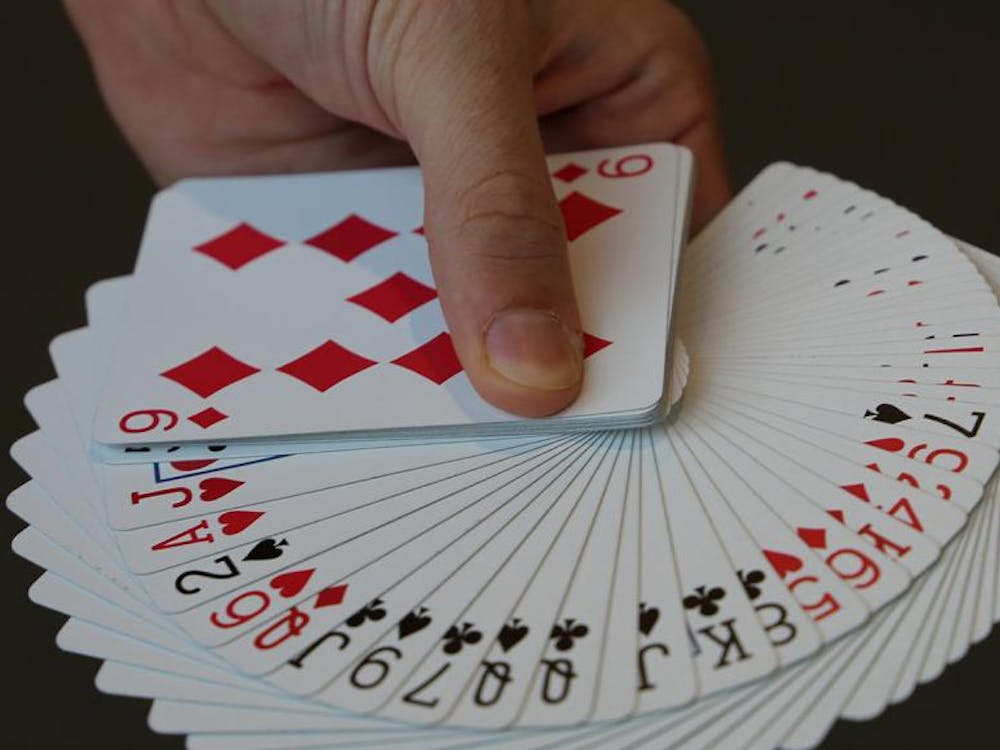In fostering holistic wellness within the Duke community, the Duke Sleight Club has a magic touch. Founded in April 2018 by junior and current president Wesley Pritzlaff, Duke Sleight Club facilitates performance and teaching sessions every Monday from 5 to 5:50 p.m. at the Student Wellness Center as part of the center’s “Moments of Mindfulness” series, as well as performing bi-weekly on the BC Plaza.
“[When I founded the club, sleight of hand] wasn’t necessarily something I was really good at or felt I had the authority to teach others,” Pritzlaff said. “I just thought others could enjoy it, and there wasn’t something on campus that it could fit into.”
Pritzlaff’s interest in magic started prior to his matriculation at Duke through viewings of the magic competition series “Penn & Teller: Fool Us” that he shared with his father. But the idea of developing that interest on campus came at the end of his first year, when a friend who was helping to develop the then-nascent “Moments of Mindfulness” initiative reached out to him to perform as part of the programming.
The sleight-of-hand magic in which the club specializes involves misdirecting spectators either physically or verbally, which distracts them from quick physical manipulations of props like cards or coins. According to Pritzlaff, this involves maneuvers such as making eye contact so the audience doesn’t look at the magician’s hands or performing at a specific angle so that part of the spectators’ view is obscured.
The wellness aspect of sleight of hand manifests both physically and mentally. Research on children with one-sided physical weaknesses due to neurological conditions has shown improvement in dual-hand ability after attending a 10-day magic camp, with sustained improvement in dexterity over six months. This correlation is of particular interest to Pritzlaff, an aspiring physical therapist, but on campus, the Sleight Club focuses primarily on the mental benefits of magic.
“I think wellness and magic have a lot of crossover,” club member and first-year Carson Termotto said. “Just manipulating cards and practicing techniques can be really soothing. For the spectator … it’s all about a break from reality, and that’s what magicians try to instill in other people — trying to get them to think about wonder.”
At the end of each “Moments of Mindfulness” session, members of the club survey participants on their contentedness, focus and stress levels compared to when they came in. Overarching trends show participants experiencing increased contentedness and focus and decreased stress levels.
“I think something cool about [sleight of hand] is that it brings you back to your childhood days — it’s this impossible thing, and I love seeing people leave a trick trying to figure it out, where it’s irritating them, but in a good way,” Pritzlaff said. “That’s a fun feeling. I hope people still believe in the impossible.”
As magicians, Pritzlaff and Termotto noted a multitude of benefits from their involvement in the sleight-of-hand community, such as increased confidence, focus and connection with others, despite its ostensible disconnect from their academic pursuits in neuroscience and political science, respectively.
While performing tricks, “There’s just this automatic connection that you have with [your audience],” Pritzlaff said. “I think in normal life it’s difficult to get that so quickly. In the college environment, people just have a lot going on, so it’s just helped to slow down time … and made me focus on interpersonal connections more.”
Now in its second year as a registered student organization, the club is focusing on efforts to teach others sleight-of-hand magic, regardless of prior experience. In addition to “Moments of Mindfulness,” the club developed a YouTube channel dedicated to trick tutorials so people who are interested in magic, but cannot attend in-person sessions, can participate in the community.
“Without the club, I probably would’ve stopped magic by now,” Pritzlaff said. “With everything else going on [as a student], there’s so much I ‘should’ or ‘could’ be doing, so I’m really glad it exists, and I hope other people get to experience it. If people want to just try a creative side, the Sleight Club’s here for them.”
Through their mindfulness and teaching efforts, as well as future initiatives such as bringing professional magicians to campus, the club hopes to promote appreciation for the magical arts and well as a broader sense of awe and wonderment at Duke.
“Magic is not really the sleight that you do in your hands, but the feeling inside other people once they see it,” Termotto said. “When you’re practicing in front of a mirror or something … it can be fun, and there’s no shame in it, but you’re just doing tricks. When someone is watching what you do and they feel that feeling of awe and astonishment and wonder — that is the true magic.”
Get The Chronicle straight to your inbox
Signup for our weekly newsletter. Cancel at any time.

